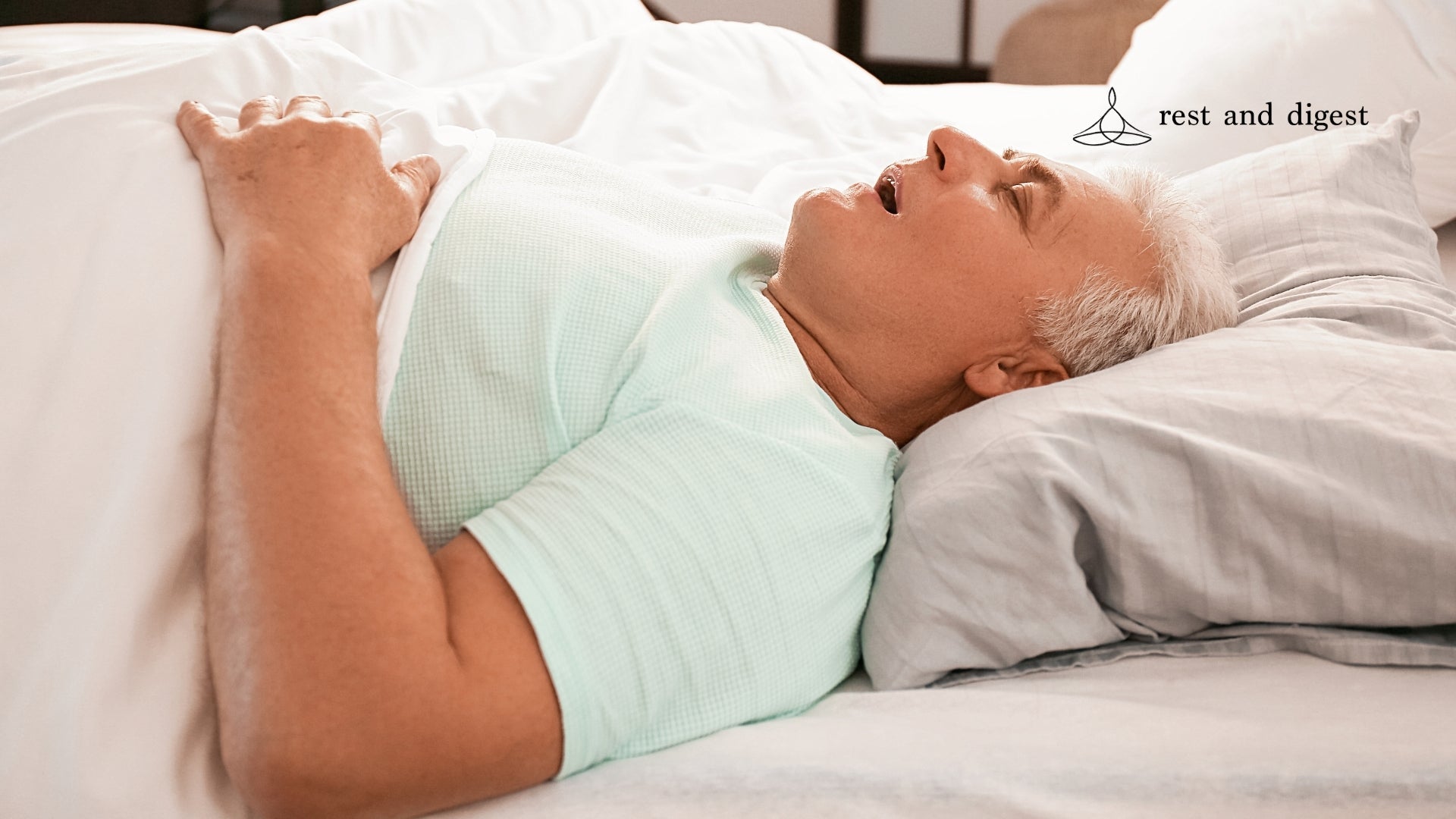
How To Stop Mouth Breathing
Mouth breathing, a seemingly harmless habit, is more common than we think and affects people of all ages. Breathing through the mouth occasionally, during exercise, is normal but chronic oral ventilation can have serious consequences. The effects can range from dental problems to sleep disorders and beyond. Learning how to stop mouth breathing is key to better health.
This guide will cover the causes, effects and solutions for managing and stopping breathing through the mouth.
What Is Mouth Breathing?
Mouth breathing, also known as chronic oral ventilation in medical terms, is when you breathe through your mouth instead of your nose. It’s more than just a matter of convenience, it bypasses the nose’s main functions which are to filter, humidify and warm the air before it reaches the lungs. Nasal breathing allows the air to be processed properly while breathing through the mouth strips away these benefits.
Doing this occasionally, like during heavy exercise or nasal congestion, is normal. However chronic oral ventilation can become a habit. Over time it can lead to many health problems including dental problems, respiratory infections and sleep disorders. Addressing mouth breathing early on can prevent these from escalating.
What Causes It?
People breathe through the mouth due to many reasons which can be either physical or habitual. Knowing the underlying causes is key to treating it.
Nasal Congestion
Nasal congestion is the most common cause of mouth breathing. When the nasal passages are blocked the body breathes through the mouth to get oxygen. Nasal congestion can be caused by colds, sinus infections and allergies. While temporary, recurrent congestion can lead to a habit of breathing through the mouth if not addressed.
Allergies
Allergies to pollen, dust mites, mould or pet dander can cause chronic inflammation of the nasal passages. This persistent blockage of the nose makes the person breathe through their mouth. If allergies are not managed properly the person may develop this as a habit.
Enlarged Tonsils Or Adenoids
Enlarged tonsils or adenoids, common in children, can block the nasal airway making it hard to breathe through the nose. These tissues at the back of the throat may become swollen due to infections or other conditions. If left untreated the enlarged tissues can lead to chronic oral ventilation which can further aggravate health issues.
Deviated Septum
A deviated septum is the misalignment of the nasal septum, the cartilage that divides the nostrils. This can cause partial or complete blockage of one or both nostrils making nasal breathing difficult or impossible. People with a deviated septum may breathe through their mouth, especially during sleep which can worsen other related conditions like sleep apnea.
Habitual Mouth Breathing
Some people may breathe through their mouth as a habit even when there is no obvious physical obstruction. Poor breathing techniques, stress and anxiety can cause this behaviour. In such cases, the habit of breathing through the mouth may persist even after the initial trigger has passed and it can be harder to break the habit and go back to nasal breathing.

Why Is Breathing Through Your Mouth Harmful?
Breathing through the mouth is not just a small inconvenience. Over time it can have significant consequences on your health, especially your oral health, respiratory system and sleep.
Dry Mouth
Breathing through your mouth dries out the oral cavity, causing xerostomia or dry mouth. This lack of moisture creates an environment for bacteria to grow, increasing the risk of infections, throat and gum infections. A dry mouth also causes discomfort, makes speaking and swallowing hard and bad breath.
Bad Breath
Mouth breathing is directly linked to bad breath or halitosis. Saliva cleans the mouth by washing away food particles and bacteria. But breathing through the mouth reduces saliva production creating a breeding ground for bacteria that produce foul-smelling compounds. This gets worse overnight and you wake up with “morning breath” which can be embarrassing and unpleasant.
Dental Problems
Chronic oral ventilation has a major impact on oral health. The reduction of saliva flow leads to plaque and bacteria buildup, increasing the risk of cavities, gum disease and tooth decay. In children, chronic oral ventilation can affect the development of facial structures leading to misaligned teeth and changes to jaw alignment.
Sleep Disturbances
Mouth breathing can be particularly problematic during sleep. It increases the risk of snoring and obstructive sleep apnea (OSA) both of which disrupts normal sleep patterns. People with sleep apnea experience repeated episodes of breathing cessation during sleep which can lead to frequent awakenings and poor sleep quality. Chronic sleep disruption can cause daytime fatigue, mood swings, difficulty concentrating and other symptoms of sleep deprivation.
How To Stop Breathing in Through Your Mouth

There are many ways to stop breathing through the mouth depending on the underlying cause. You need to address both the physical factors and habitual patterns.
Identify And Treat Underlying Causes
The first step to stop breathing through the mouth is to identify the cause. If it’s nasal congestion, allergies or enlarged tonsils then you need to fix those. Nasal decongestants, antihistamines or allergy treatments can help reduce nasal blockage. In more severe cases like deviated septum or enlarged tonsils then surgical intervention may be required.
Practice Nasal Breathing Techniques
Breathing through your nose consciously is another way to overcome this. Simple nasal breathing exercises like diaphragmatic breathing or alternate nostril breathing can help you get used to breathing through your nose. Throughout the day, keep your mouth closed and take slow deep breaths through your nose.
Use Nasal Strips Or Dilators
Nasal strips or nasal dilators can be helpful in promoting nasal breathing. These devices work by mechanically opening the nasal passages, making it easier to breathe through the nose, especially at night. Nasal strips are often used by people who snore or have sleep apnea as they help reduce airflow obstruction and promote better breathing habits.
Try Breathing Exercises
Specific breathing exercises like Buteyko breathing can help you train yourself to breathe through your nose. The Buteyko method emphasises nasal breathing and increases carbon dioxide in the body which can improve overall respiratory function. Practising these exercises regularly can recondition your body to rely on nasal breathing.
Use A Mouth Guard Or Chin Strap
For those wondering how to stop mouth breathing while sleeping, a mouth guard or specialised chin strap can be a lifesaver. These devices keep your mouth closed and promote nasal breathing. A mouth guard can also protect your teeth from grinding at night and a chin strap is good for people who have sleep apnea. Consult a dentist or sleep specialist to find the right device for you.
Consult A Doctor For Severe Cases
In severe cases, especially if linked to structural issues like deviated septum or sleep apnea it is advisable to see a doctor. A healthcare provider may recommend surgery or specific treatment to fix the underlying condition. Also, Continuous Positive Airway Pressure (CPAP) therapy is prescribed for people with sleep apnea to maintain airflow during sleep.

How To Stop Mouth Breathing Naturally
Wondering how to stop mouth breathing using more natural alternatives? Rest and Digest got you covered. Our products help create a more naturally comfortable sleep environment which can help nasal breathing.
Start with our hypoallergenic Mulberry Silk Pillowcases which are designed to reduce allergens like dust mites that can cause nasal congestion. Keeping your pillowcase clean and hypoallergenic helps keep nasal passages clear so you can breathe through your nose. Pair this with our Restore Eye Pillow which provides gentle pressure to release tension and prepare your body for a more restful night’s sleep and help you wake up feeling fresh.
After a long day, our Base Collective Magnesium Bath Salts are perfect for unwinding, releasing muscle tension and promoting deep relaxation for better sleep. For targeted relief, our Magnesium Oil Spray can help soothe discomfort and support a more comfortable sleep. If a racing mind is keeping you awake our Bach Original Flower Remedies Rescue Sleep Spray can calm stress and anxiety, create a sleep conducive environment and encourage nasal breathing throughout the night.
To add to your bedtime routine, Love Tea Organic Sleep Tea is a calming herbal blend of organic ingredients to promote sleep. Available in pyramid tea bags and loose-leaf options this customisable tea is a soothing way to unwind and drift off to sleep.
Chronic oral ventilation can have many negative effects on your oral health, sleep and overall well-being. While occasional mouth breathing is normal, doing this habitually is bad and should be addressed as soon as possible. By understanding the causes and following the tips above on how to stop mouth breathing you can improve your health and reduce the risks. Whether you want to learn how to stop mouth breathing while sleeping or during the day, this guide will help you develop better nasal breathing habits.





